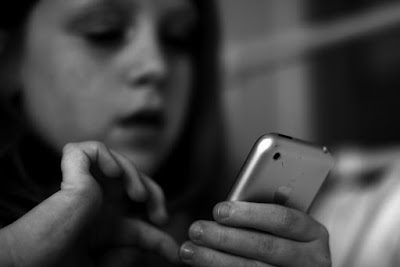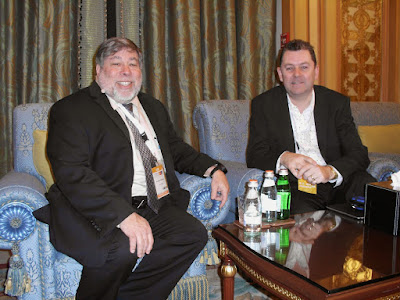I was asked to write an opinion piece for the Western Morning News earlier this week as a response to the comments from Ofsted and their advisers on the use of technology in schools. Many teachers are left wondering whether personal technologies such as smartphones actually have a place in education and what risks and threats accompany them. My view is that children can and do use technology to support their learning but they need to be guided to do so responsibly.
(It has been edited from my original longer version and can also be viewed here on the newspaper site).
When slate was replaced by paper there was a public outcry. Many complained that paper and pencils were too expensive, and that they would ruin children’s writing skills. Sound familiar?
Progress within education is not a new dilemma, and has been discussed for generations. But why is technology still a bone of contention? By its nature, it moves on while schools can be notoriously conservative places where little change happens.
As for smartphones, some claim there is no scientific evidence that technology has improved learning in schools, and I took part in a public debate almost a decade ago where this question was raised. I answered with a single phrase: “special educational needs”. Suddenly the debate was over and my opponent conceded the point.
For many children who have physical or cognitive impairment, technology doesn’t just support learning, it enables learning to happen. This is just one example. I can take you to many schools in the Plymouth area where technology is being used responsibly and creatively to engage children, enhancing, extending and enriching their learning experiences.
They use smartphones and tablets to solve maths problems, blog to develop their creative writing skills, build robots and learn how to code. These are new forms of literacy I didn’t learn in school, but they are transferable skills that will be needed in the future, when our children enter a world of work significantly different from today.
Many children have a natural affinity with technology. They bring their smartphones into the classroom, and will use them whether schools ban them or not. Teachers are wary of the darker side of mobile phones. They worry about children accessing dangerous content, or using cameras to send each other images they wouldn’t want their parents to see.
Recently there have also been warnings from Ofsted that mobile phones are distracting children from their lessons. These are reasonable concerns. Children are easily distracted by texting in class, but to completely ban smartphones in schools is short-sighted, and ignores a fundamental truth of our present society. Like it or not, we are surrounded by technology, and it isn’t going away.
Technology is neutral until used for a specific purpose, good or for bad. We shouldn’t blame smartphones for the way they are used. Instead it would be wise to harness the power of these tools for learning and teach children to use them responsibly. Children need to be taught from an early age about acceptable use, and every school should include digital citizenship in its curriculum. This would go a long way to addressing the problem.
At an education conference in New Zealand a few years ago a primary school principal in my audience said: “We don’t allow the Internet in our school. There are too many dangers.” My response was: “So you don’t teach your children to safely cross the road either - because that’s also dangerous?”
Technology has its dangers. But surely school is the safest place for children to learn how to use technology? It is a controlled environment where they can ask questions and discover for themselves what to avoid. If schools don’t manage this process, children will learn how to use technology in their bedrooms or behind the bike sheds. But to what dangers might they be exposed, and who will know to help them?
Teaching should never be led by technology, but technology can influence change. Arthur C Clarke, the science fiction writer, once commented: “Any teacher who can be replaced by a computer, should be.”
Teachers should not simply deliver content. Indeed, there is evidence that teachers’ roles are changing because of technology. Many encourage students to drive their own education, and the technology supports this independent learning.
As students take more responsibility, teachers adopt the roles of questioner, coach and facilitator. The teacher becomes a guide, a mentor in the room for when children need expert help. Teachers will not be replaced by technology, but teachers who use technology will probably replace those who don’t.
When smartphones are used appropriately, learning can continue beyond the walls of the classroom. Children can learn on the move, because they have a connection to their course work and to their teacher and peers through their phone - if the school allows it. Ban them, and the opportunities are more limited. Learning doesn’t need to be confined to school hours. If their experience is exciting and motivating, children will want to continue learning long after the school bell. A passion for learning is the best preparation for the future.
Technology is like water to a fish. It surrounds us, and we rarely notice it, but we use it all the time. Instead of keeping children away from the water, we should teach them to swim. Any alternative would be unthinkable.

Why schools shouldn't ban smartphones by
Steve Wheeler was written in Manchester, England and is licensed under a
Creative Commons Attribution-NonCommercial-ShareAlike 3.0 Unported License.








